简体中文
繁體中文
English
Pусский
日本語
ภาษาไทย
Tiếng Việt
Bahasa Indonesia
Español
हिन्दी
Filippiiniläinen
Français
Deutsch
Português
Türkçe
한국어
العربية
Oanda: A Closer Look at Its Licenses
Abstract:OANDA is a global forex and CFD broker with many years of presence and multiple regulatory licences. Yet, despite its regulated image, it has attracted a significant number of complaints from traders.
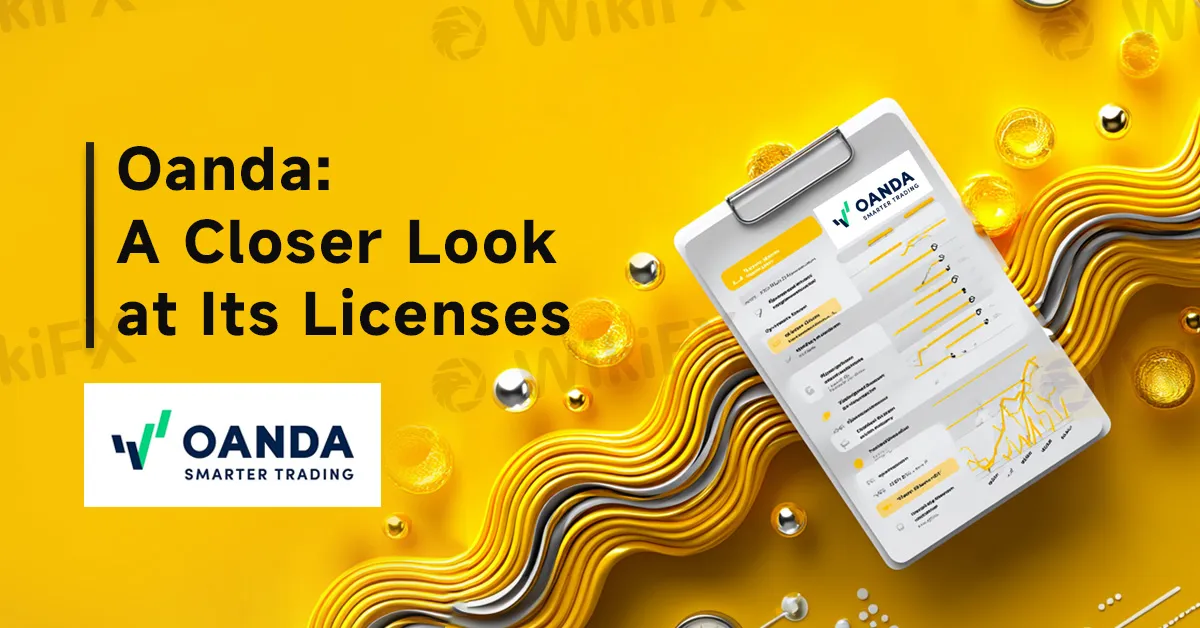
OANDA is a global forex and CFD broker with many years of presence and multiple regulatory licences. Yet, despite its regulated image, it has attracted a significant number of complaints from traders. For Malaysian investors, these issues are especially relevant as the Securities Commission (SC) has already flagged clone entities misusing OANDA‘s name. This review, from the perspective of WikiFX, evaluates OANDA’s licences, its WikiScore, and documented user feedback to help Malaysian traders judge its reliability.
WikiScore & Regulatory Profile
On WikiFX, OANDA holds a WikiScore of 8.40/10, which is respectable but not perfect. The site notes that the score has been reduced because of too many complaints lodged against the broker. The score is derived from multiple factors, including licensing, business operations, trading environment, and user feedback.

View WikiFXs full review on OANDA here: https://www.wikifx.com/en/dealer/0001134561.html
Regulatory Footprint of OANDA
OANDAs global presence is anchored by multiple regulatory approvals across several major jurisdictions. Each of these licences carries its own weight, responsibilities, and implications for investor protection.
Australia – ASIC (Australian Securities and Investments Commission)
- OANDA holds a Market Maker (MM) licence under the oversight of ASIC, one of the most respected regulators globally. ASIC enforces strict requirements regarding capital adequacy, risk management, and transparency. It is also known for taking enforcement actions against brokers who mislead clients or mishandle funds. For Australian traders, this regulation provides a strong sense of legal recourse. For Malaysians using OANDAs ASIC entity, it means their accounts are technically under a regulator that requires detailed financial reporting and dispute resolution frameworks.
United Kingdom – FCA (Financial Conduct Authority)
- The FCA licence is another critical pillar of OANDA‘s legitimacy. The FCA regulates financial firms that provide services to consumers and maintains the integrity of the UK’s financial markets. A Market Maker licence under the FCA means OANDA can execute trades internally but must do so transparently and under strict compliance measures. FCA-regulated brokers are also required to participate in the Financial Services Compensation Scheme (FSCS), which can compensate retail clients in case the broker becomes insolvent. This is an important safety net, though its applicability may depend on which OANDA entity a client is registered with.
Japan – FSA (Financial Services Agency)
- In Japan, OANDA operates under the FSA, holding a Retail Forex licence. The FSA is one of the strictest regulators in Asia, requiring brokers to maintain high levels of capital and offering strong investor protections. Japanese regulation is particularly strict on leverage, trade reporting, and ensuring that forex brokers do not expose retail investors to unnecessary risks. For global investors, OANDAs presence in Japan signals that it can meet some of the most demanding compliance standards.
United States – NFA (National Futures Association)
- The US branch of OANDA is registered with the NFA, holding a Market Maker licence. The NFA is a self-regulatory organisation with oversight from the CFTC (Commodity Futures Trading Commission). Together, they enforce some of the toughest forex and derivatives trading rules worldwide. US forex brokers face restrictions on leverage, must segregate client funds, and are audited frequently. For many traders, having an NFA licence is the gold standard, as very few brokers qualify to operate in the US market.
Canada – CIRO (Canadian Investment Regulatory Organization)
- In Canada, OANDA is licensed by CIRO, which was formed in 2023 through the merger of IIROC (Investment Industry Regulatory Organization of Canada) and MFDA (Mutual Fund Dealers Association). CIRO regulates investment dealers, including forex brokers, and mandates rules on client fund protection, margin requirements, and trade conduct. The Canadian system also ensures that brokers must contribute to the Canadian Investor Protection Fund (CIPF), which provides compensation in the event of broker insolvency.
Singapore – MAS (Monetary Authority of Singapore)
- OANDA also holds a Retail Forex licence from the MAS, Singapore‘s central bank and financial regulator. MAS is known for its prudence and strict oversight, ensuring brokers operate transparently and maintain adequate safeguards against fraud and mismanagement. Singapore is a hub for financial services in Asia, and a MAS licence provides OANDA with credibility in one of the region’s most important markets.
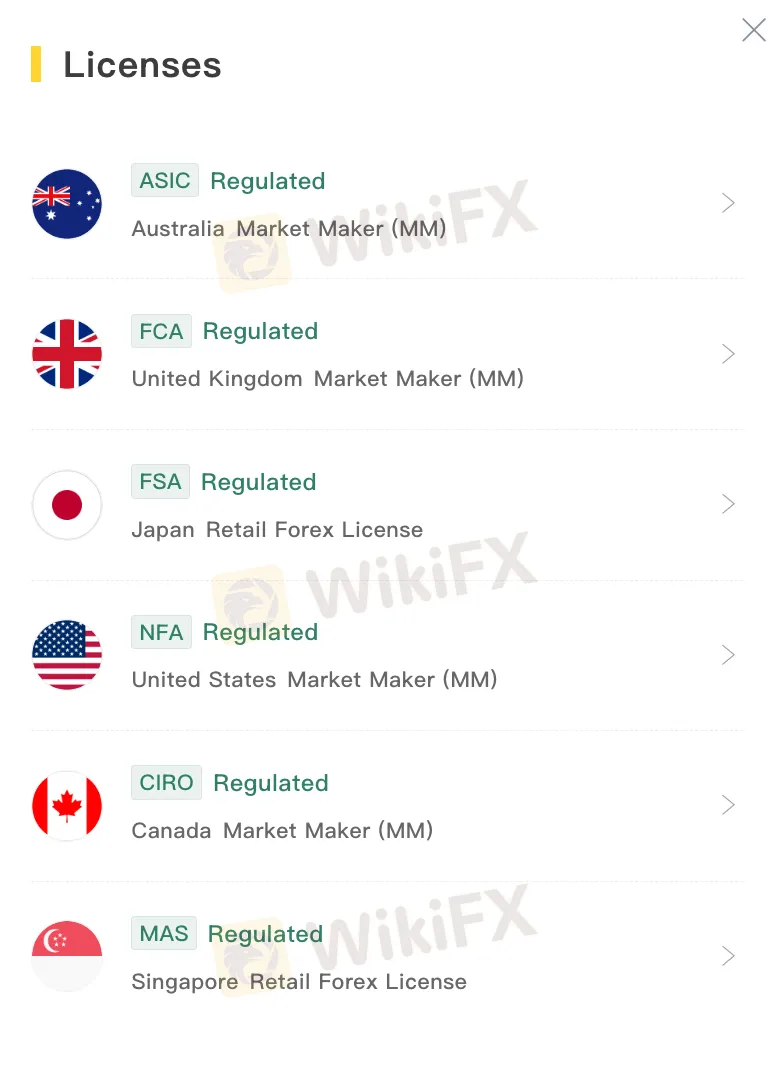
Why Licences Matter
These licences suggest that OANDA, at least in its official, regulated entities, has gone through extensive vetting processes. Each regulator demands compliance with capital requirements, reporting, and operational standards. However, the presence of multiple regulators also creates complexity: not every trader is automatically protected by all of these rules. Malaysian investors, for example, must confirm which OANDA entity their account is registered under.
Furthermore, even heavily regulated brokers can face serious user complaints. This underscores the importance of combining regulatory checks with real-world trader experiences, as seen in the Exposure section of WikiFX.
These licences indicate that OANDA submits to oversight in many of the worlds strictest markets. However, no regulatory setup is immune to operational issues or misuse, which is where user complaints become a crucial check.
Complaints from Real Users (WikiFX Exposure)
The Exposure section on the WikiFX OANDA page lists over 103 user complaints as of 3 October 2025, signalling that many traders have encountered issues. Below are some notable cases:
- A user from Indonesia reported that funds could not be withdrawn because the platform demanded that the “investment funds must be upgraded and added.”
- In South Korea, a trader said he had profited after investing approximately 100 million won but was unable to withdraw 100 million when requested. His trading was then prohibited.
- A complaint from Japan (炎炎1532) describes suspicious price movements: the user said his stop-loss was triggered at 97.967 during the night, even though independent quotes showed much lower prices. He questioned the fairness of execution.
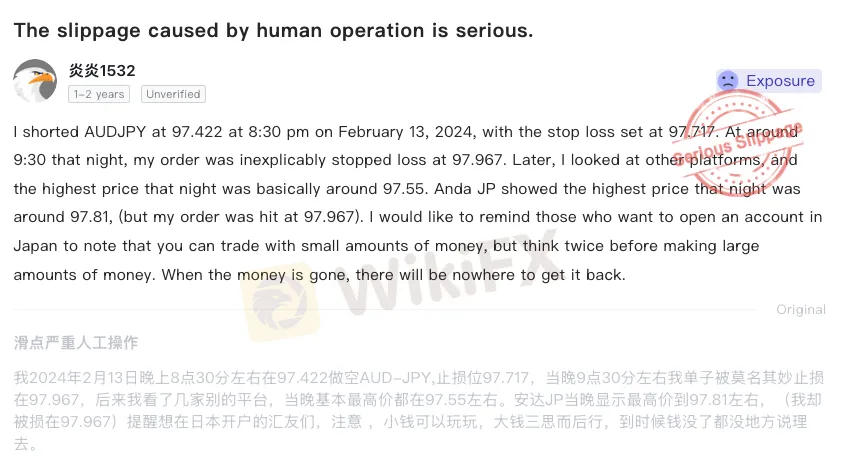
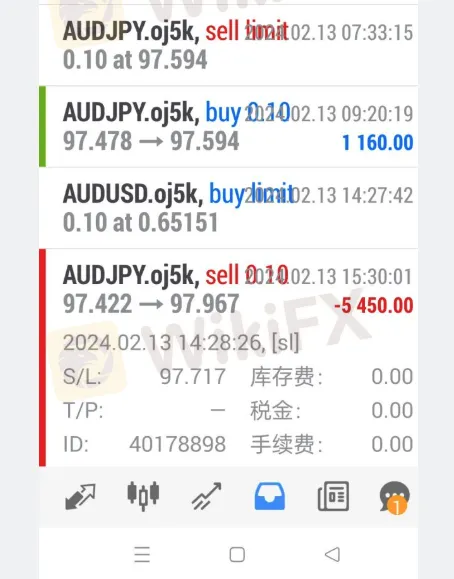
Clone Warning in Malaysia
For Malaysian traders, the risk is amplified by known clone operations. The Securities Commission of Malaysia has specifically flagged a potential clone entity using the name OANDA SDN. BHD. / Oanda Malaysia Corporation, and websites like oanda2u.com and web.oandapremium.com. The SC warns that these entities are conducting unlicensed capital-market activities (derivatives and securities), misusing SCs name, and representing themselves as part of US-based OANDA.
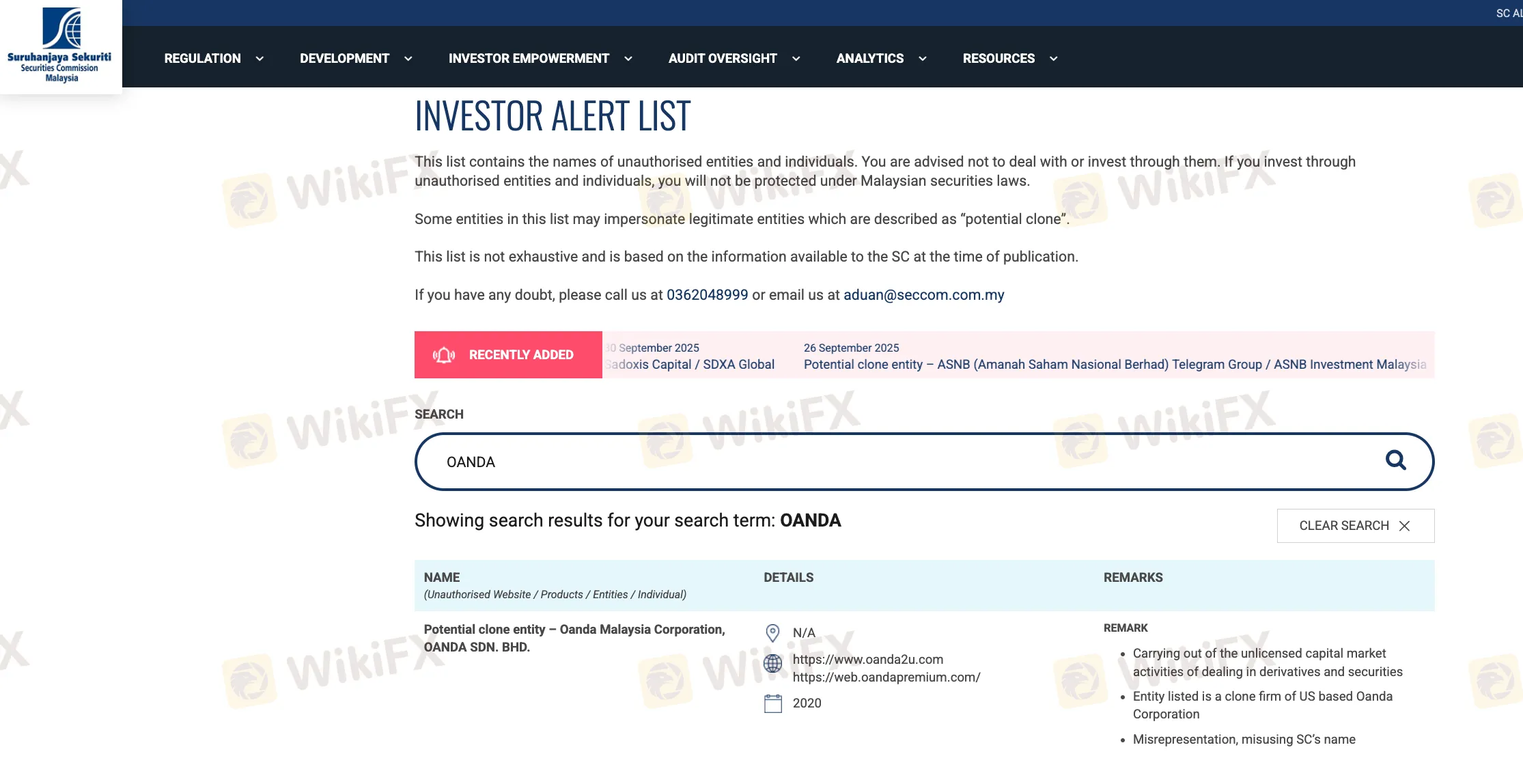
While the real OANDA is not currently on Malaysias SC Investor Alert List, this clone warning serves as a strong signal: Malaysian investors should verify directly with regulators (ASIC, FCA, MAS, etc.) before trusting any “OANDA” that solicits them locally.
Why These Complaints Matter
The presence of multiple, similar complaints from different regions suggests systemic issues, rather than rare anomalies. A legitimate broker can make mistakes, but when many clients report withdrawal blocks, forced upgrades, and inconsistent pricing, it suggests deeper operational or integrity lapses.
Complaints are especially important in regions where legal recourse is weak. That is why reviewing the Exposure section on WikiFX is so essential, as it gives visibility into real user experiences beyond marketing promises.

Things Malaysian Traders Should Do
- Cross-verify licences. Always check the regulators official sites to confirm the licence status of the entity you intend to use.
- Review complaints. Use WikiFXs Exposure section to see if there are unresolved user issues.
- Start small. If you test OANDA with a small deposit, see whether withdrawals and account support work as expected before scaling up.
Conclusion
OANDA holds a strong regulatory footprint across top-tier jurisdictions, which adds credibility. Yet, the 103+ complaints found on WikiFX Exposure cannot be dismissed. Withdrawal issues, forced account changes, and questionable execution raise red flags for any trader. For Malaysians, the existence of clone entities further complicates the picture.
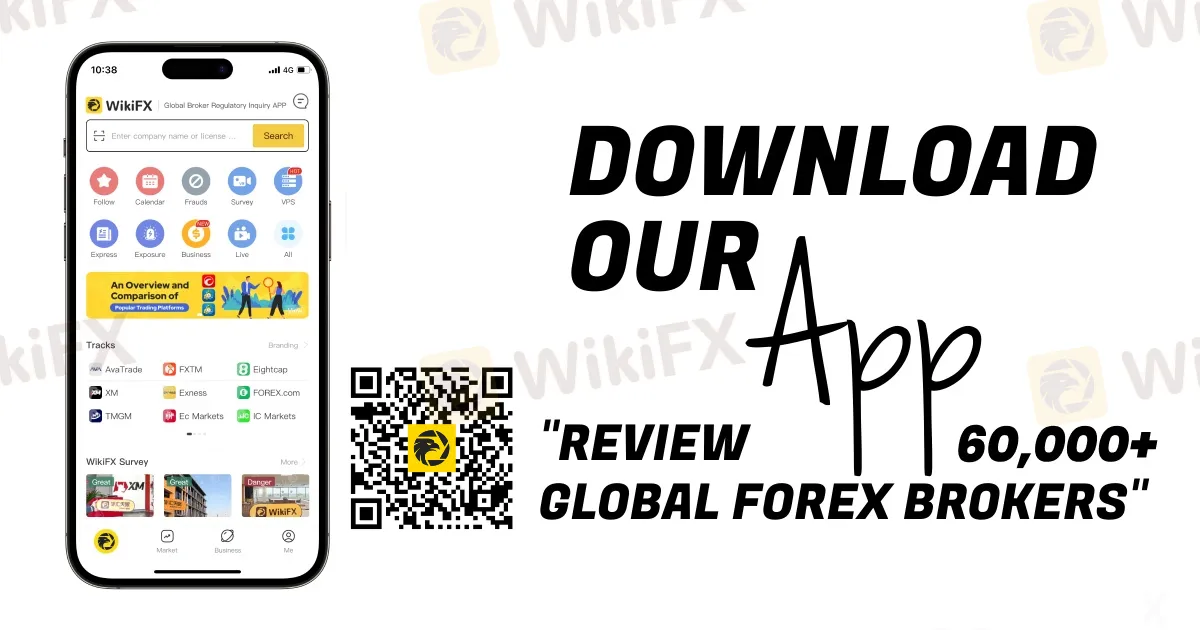
Disclaimer:
The views in this article only represent the author's personal views, and do not constitute investment advice on this platform. This platform does not guarantee the accuracy, completeness and timeliness of the information in the article, and will not be liable for any loss caused by the use of or reliance on the information in the article.
WikiFX Broker
Latest News
China Reportedly Scraps Three Red Lines Reporting, Signaling Property Sector Pivot
Grand Capital Review: The Anatomy of a Regulatory Fugitive
Emerging Currencies and Gold Rally as US Dollar Stumbles
Fortrade Review 2026: Is this Forex Broker Legit or a Scam?
SARB Defies Easing Expectations with Hawkish Hold on Rates
Geopolitical Risk Ignites Commodities: Gold Eyes $5,600, Oil Rallies on Iran Fears
Resource Sector Insight: Mining Community Stability Flashed as Key Risk to EM Capital Flows
Understanding Broker Regulation and Licenses
Fed Signals 'Dovish Pause' as Political Pressure Mounts on Powell
Melaka police bust fake investment scam run by Chinese nationals
Currency Calculator



